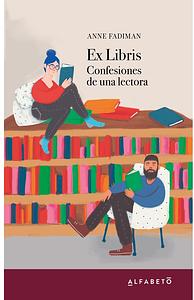Take a photo of a barcode or cover
A book about books and the author's relationship with her bibliophile father.
emotional
funny
lighthearted
reflective
medium-paced
funny
informative
inspiring
lighthearted
reflective
relaxing
medium-paced
Despite it's short length, this book was dense and meaty. I'm glad I stuck with it and finished it. Fadiman is obviously well-read and well-educated; that comes through in her writing. She also has many interesting things to say about reading, books, and literature. If you love those things too- I highly recommend this little tome.
lighthearted
reflective
medium-paced
This book was a welcome encounter. I've been reading more essays lately, and I'm thankful to have alighted upon it. At times thoughtful, at times humorous, at times sincere, I appreciate her style, wit, and polysyllabic verbosity. If you have yet to read anything by her, this is a great start!
I picked this up because someone recommended the first essay, Marrying Libraries, and that piece was adorable and amusing. 18 total essays on books and reading and words. Fadiman is much more intellectual than I, so some essays were more difficult to relate to than others, although all were well-written. For example, I'm not a fan of big words for their own sake (the subject of one essay, not a description of her writing style) and I have never considered writing sonnets. I could, however, relate to compulsive proof-reading and to a love of mail order catalogs. Her enthusiasm for books as objects, for the way they furnish a home as well as a mind, is appreciated. It's a nice warm fuzzy mug of cocoa of a book.
A wonderful collection of essays about the love of books--what Anne Fadiman calls a carnal love, one that prefers used books to new, dog earing pages to bookmarks, and--most importantly--write in books, inscribing them, in the margins, or just about anything else. Each essay is brilliantly written, witty, insightful, passionate, and charming. Much more about the love of reading than any particular book or author, Fadiman deliberately approaches the subject as a "common reader" but what emerges is an uncommon portrait of a reader, the family she grew up with, and the husband she shares her love of books with.
Every essay is worth calling out and all have many lines that you want to call up and read to people you know. A few examples:
An essay on combining her library with her husband's: "our record collections has long ago miscegenated without incident, my Josquin Desprez motets cozying up to George's Worst of Jefferson Airplane, to the enrichment, we believe, of both. But our libraries had remained separate... We agreed that it made no sense for my Billy Budd to languish forty feet from his Moby-Dick, yet neither of us had lifted a finger to bring them together."
An essay entitled "The Joy of Sesquipedalians" about difficult words in books and whether we have more or less of them now and what that means is in the same volume as "The Catalogical Imperative" about her love of reading catalogues (but not actually ordering from them).
An essay about treating books that contrasts "courtly love" and "carnal love" of books, based on how their readers treat them. (Although most of the other essays in the book contradict Fadiman's claim that "a book's words were holy, but the paper, cardboard, glue, thread and ink that contained them were a mere vessel.")
An essay on plagiarism and borrowing is largely plagiarized and borrowed from other sources--all of them elaborately footnoted.
The last essay ends with the sad note about selling off the books of a historian who had passed away: "Dispersing his books was like cremating a body and scattering it to the winds. I felt very sad. And I realized that books get their value from the way they coexist with other books a person owns, and that when they lose their context, they lose their meaning."
Every essay is worth calling out and all have many lines that you want to call up and read to people you know. A few examples:
An essay on combining her library with her husband's: "our record collections has long ago miscegenated without incident, my Josquin Desprez motets cozying up to George's Worst of Jefferson Airplane, to the enrichment, we believe, of both. But our libraries had remained separate... We agreed that it made no sense for my Billy Budd to languish forty feet from his Moby-Dick, yet neither of us had lifted a finger to bring them together."
An essay entitled "The Joy of Sesquipedalians" about difficult words in books and whether we have more or less of them now and what that means is in the same volume as "The Catalogical Imperative" about her love of reading catalogues (but not actually ordering from them).
An essay about treating books that contrasts "courtly love" and "carnal love" of books, based on how their readers treat them. (Although most of the other essays in the book contradict Fadiman's claim that "a book's words were holy, but the paper, cardboard, glue, thread and ink that contained them were a mere vessel.")
An essay on plagiarism and borrowing is largely plagiarized and borrowed from other sources--all of them elaborately footnoted.
The last essay ends with the sad note about selling off the books of a historian who had passed away: "Dispersing his books was like cremating a body and scattering it to the winds. I felt very sad. And I realized that books get their value from the way they coexist with other books a person owns, and that when they lose their context, they lose their meaning."






